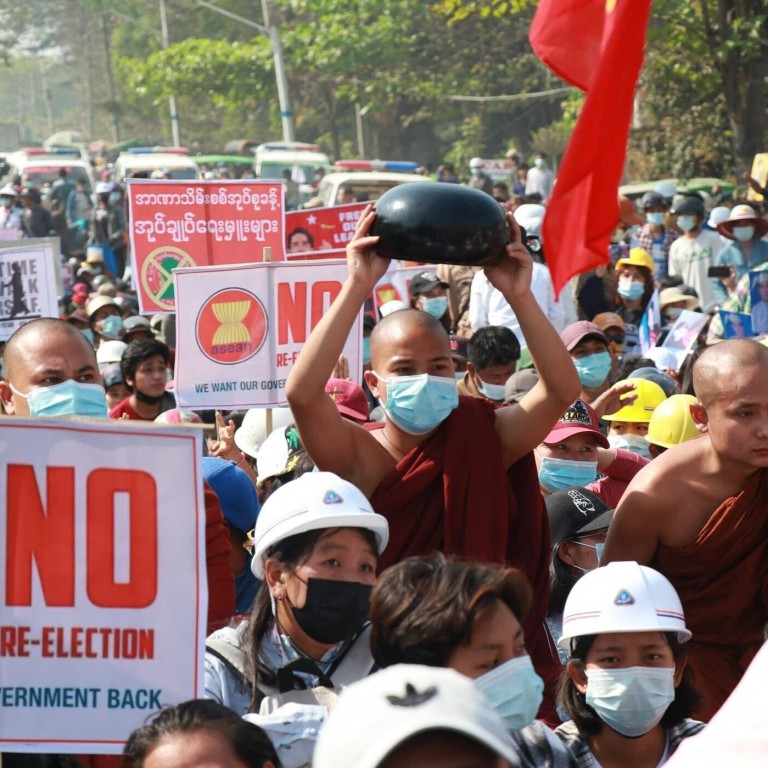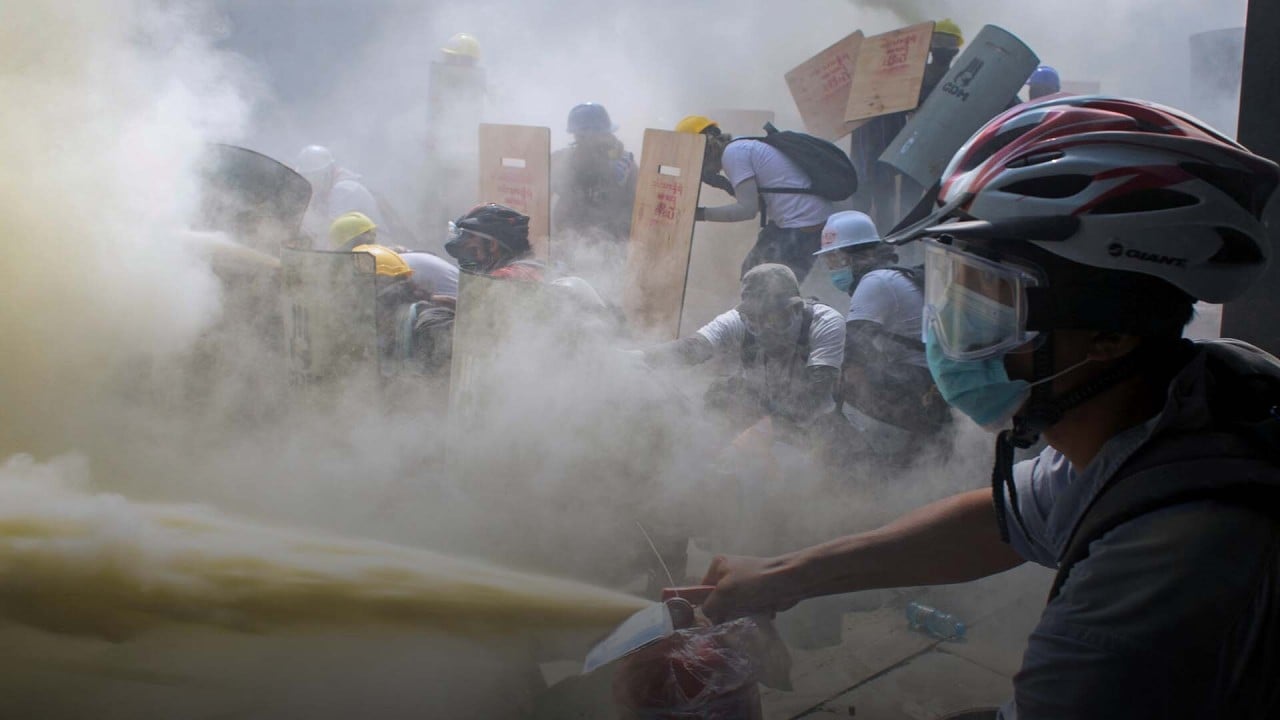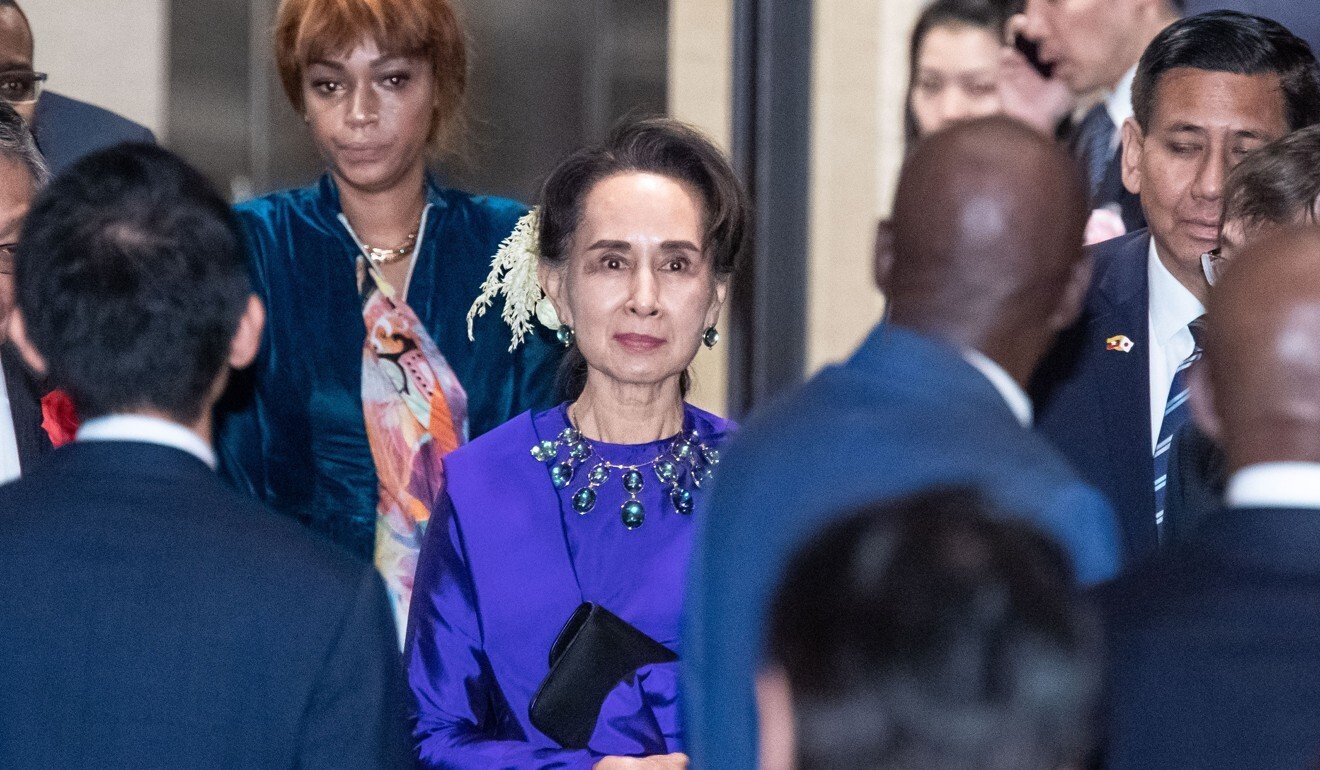
Myanmar coup: from Chinese to Christian to Buddhist, most people of different faiths and ethnic groups unite to defy junta
- In a country in need of a shared dream, unprecedented unity across most ethnicities emerges, though among the Rakhine and Mon, feelings are mixed
- Many say they want not only to restore democracy but to build a more inclusive state ‘with everyone’
Mawun Kaw, 32, an ethnic Kachin and an NGO worker, said distrust had long permeated society and those of different ethnic or religious groups did not interact much, even in her high school. But unity was on show in full force during last month’s protests.
“I have never seen people so united … since the coup we have been living in fear,” she said.
The first time she marched on the streets, people along the way cheered the group and offered food and drink. Many joined in, swelling the numbers from around 200 to 10,000. A few days later, a protest drew 30,000 to 40,000.
Myanmar coup: why military felt threatened by ‘stubborn’ Suu Kyi
Stories of solidarity between the numerous ethnic and religious groups making up Myanmar’s 54 million population have emerged in the past month, with some of the various armed groups that have long sought more autonomy also backing a broad movement against military dictatorship.
The scenario has repeated itself from north to south, across cities and towns of the mountainous Chin, Shan, Kayah, Kayin and Mon states.

In Taunggyi, capital of Shan state, people from various ethnic groups have worn their traditional clothing at protests.
“Although some ethnic parties ally with the USDP [Union Solidarity and Development Party, backed by the military], common people unite for the common goals,” said an activist in Taunggyi who has frequently participated in local demonstrations.
In Kayin state in southeastern Myanmar, dissidents are seeking out the ethnic armed group Karen National Union (KNU) for protection. Saw Thalar Moemin, an NGO worker in Kawkareik, a small town in Karen state, said most ethnic Karen people and the KNU did not support the 2008 constitution, which was drafted by the military to enshrine its influence over politics amid the transition to democracy. Rather, people were committed to “fight for democratic principles.”

‘PEOPLE LIKE MYANMAR CHINESE’
Myanmar Chinese faced extra difficulty getting documents issued and winning acceptance from mainstream society. The 1967 anti-Chinese riots remained a defining event that forged the apoliticism of elder Myanmar Chinese. Many have since chosen to eschew practising Chinese traditions.
While senior Myanmar Chinese have urged youngsters not to take part in street protests, Terry Mah, 29, a Chinese Muslim in Mandalay, Myanmar’s second largest city, said that in his generation “everyone likes democracy and does not want to live under the military dictatorship”, regardless of ethnicity.
He joined demonstrations holding placards with the slogan “Myanmar Chinese oppose the coup” written in Burmese and Chinese and took part in community patrols at night. One day, he and neighbours helped save from the hands of the police a firefighter who had refused to work for the junta.
Myanmar’s Gen Z protesters defy powerful military with ‘innovative’ signs
Because of his ethnic and religious identities, he used to feel “nagged and disliked everywhere”. His university classmates would try to irritate him by saying they would sell pork in front of a mosque – even though the consumption of the meat is not permissible in Islam – or say in reference to his ethnicity, “the whole country resents you guys”.
But he felt ethnicity-based differences had been washed away following the coup on February 1. The ensuing antimilitary movement had been generally cautious to distinguish ethnic Chinese from the government of China, which was accused of being too uncritical of the junta, he added.
Myanmar Chinese translated the protest slogans and statements into Chinese.
“People like [Myanmar] Chinese,” he said.

03:56
Myanmar police kill at least 18 in deadliest anti-coup protests yet, UN Human Rights Office says
APOLOGIES FOR IGNORANCE
A Twitter user named Myo commented under Lee’s tweet urging the junta release State Counsellor Suu Kyi and President Win Myint: “I do want to apologise for the way I treated you in recent years regarding the Rohingya.”
Last month, a placard at a street protest read: “From Kachin to Rohingya, we deeply apologise to all the people under oppression.” Rohingya associations also joined protests in Yangon, Myanmar’s commercial capital, holding pictures of Suu Kyi, even though she has lost much credibility for defending the violence.
In the past two years, young activists have campaigned in Yangon against the military’s attacks on Rohingya communities, but their cause did not resonate with most people, said an ethnic relations researcher who is ethnically Rakhine. He asked not to be identified due to the sensitivity of the issue.
“But this [apathy towards the plight of the Rohingya] has changed since February 1,” he said.
Myanmar military urged not to ‘invite’ foreign intervention
Among the Bamar population, the junta’s stronghold over the country – resulting in internet shutdowns and police brutality against protesters with at least 30 killed and more than 1,000 arrested, charged or sentenced – has been a wake-up call. Those living in Myanmar’s larger cities had not experienced internet disruption since low-cost mobile data became popular in 2015, so the shutdowns made them realise what those in Rakhine and Chin states had lived through during the world’s longest internet blackout, which lasted nearly 18 months and ended only on February 2 this year.
“Now we know how they [the military] kill people,” said Aye, 28, an educator in Yangon. “We now live with greater sympathy and sense of responsibility. We don’t want our younger generations to be traumatised by authoritarian rule any more.”
Political observers said even people who were previously defensive against any international criticism over the treatment of the Rohingya had now begun to acknowledge that military atrocities – including murder, rape, and arson – were taking place.

MIXED FEELINGS
Still, amid the waves of anti-coup outrage across the country, Rakhine state in western Myanmar stands as an exception, where response to the coup has been largely muted.
The apathy is mainly due to armed conflicts between the Myanmar army and the Arakan Army (AA) that have escalated in the past two years, with an intensity of fighting that the country has not seen in decades. The armed clashes have led to more than 300 civilian deaths and 236,000 displaced.
AA emerged as the most popular ethno-nationalist organisation in Rakhine as local political parties failed to significantly enhance ethnic rights under the Bamar-dominant quasi-civilian governments.
To the disappointment of the Rakhine, Suu Kyi praised soldiers of the Myanmar army as “risking their lives” to protect people.
“People feel that they already lived under authoritarian rule before the change,” said Phru Nu Khine, 28, an ethnic Rakhine freelance worker for an NGO. “The coup made no difference to them.”
The Arakan National Party, the most influential ethnic political party in Rakhine state, joined the State Administrative Council (SAC), a 16-member central executive body formed by the military commander-in-chief Min Aung Hlaing a day after the coup.
In Yangon, Phru Nu Khine co-initiated several “Rakhine strikes” to show that Rakhine youngsters like her also opposed the coup, but she and her compatriots were much criticised by people in their hometowns.
Myanmar’s protesters are undaunted for now – but how far can military be pushed?
She agonised that Rakhine youth with progressive thoughts faced “double pressure”, from the junta and their peers.
Among the Mon ethnic minority group, feelings are also mixed.
Mon Unity Party (MUP), founded in 2019 with a merger of two major Mon parties, made a controversial decision on February 6 to join forces with the junta.
“Both sides are emotional,” said an MUP member who felt that people in Mon state were deeply split after the coup. He disliked that some civil servants were pressured to join the civil disobedience movement, but said that from a liberal democrat’s view he could not agree with his party’s decision.
In the 2020 general election, the MUP won six out of the 23 elected seats in the Mon state parliament, faring better than most local parties in other ethnic states. The NLD provoked rage with its insistence on naming a new bridge in the Mon capital of Mawlamyine after General Aung San – Suu Kyi’s father, the founding father of Myanmar and a Bamar hero – despite local dissent.

03:09
‘It will be the Myanmar population who will hurt’ says Singapore's PM Lee Hsien Loong
In some areas, people lived with security concerns even before the coup. Protests took place in just three of the 10 major cities in eastern Shan state. People feared the myriad militias in the region, financed by the Myanmar military or local forces, said a former politician from an ethnic minority group in Kengtung.
Many proponents of the anti-coup movement have said they want not only to build a true democracy but to make a more inclusive state.
Said Swe, 30, a protester in Yangon: “We did not know the suffering of rural people who lived under civil war. If we win this time, our standard for democracy will be high. We will build a real democratic federal state with everyone.”
A Yangon-based European political analyst said ethno-nationalists were unlikely to start trusting the Bamar now, but these voices would become increasingly marginalised, as the movement had reinforced the sentiments of national unity.
He also said it made no sense to talk of an “ethnic nationality” as a coherent group in which every member thought the same way.
What is clear is that in the general election last November the NLD won a landslide victory not only in the country’s heartland but in states that were home to ethnic minority groups too.
Said Van Cung Lian, a political researcher in Chin state in northwestern Myanmar: “International support for Myanmar in the last decade focused much on livelihood and the peace process, the reconciliation between the military and the armed elites. When the common enemy [the junta] no longer exists, we need more efforts, on the grass roots level, to facilitate mutual understanding among all peoples.”

